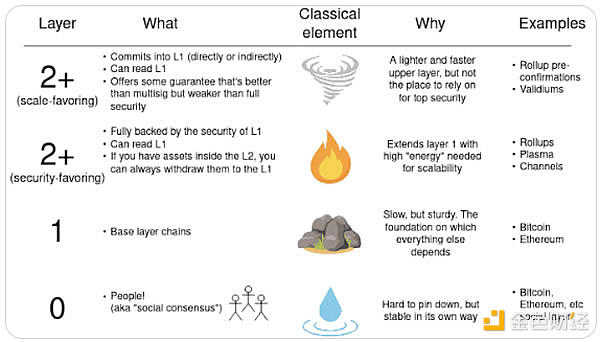Author: Martin Young, Cointelegraph; Compiler: Songxue, Golden Finance
Ethereum co-founder Vitalik Buterin sparked a discussion on how to classify various Layer-2 scaling solutions, claiming that Blockchain verification is not a real Rollup solution.
On January 16,Buterin agreed with comments made by Daniel Wang, founder of Ethereum rollup solution Taiko, on X (formerly Twitter), saying whether Ethereum rollup uses another data chain To achieve data availability - such as the modular blockchain Celestia - that is Ethereum verification.
“That’s right,” Buterin replied. "At its core, Rollup is about unconditional security: you can get your assets out even if everyone else is against you."
"You can't do that if data availability relies on external systems A little bit," he added.
Validium is an Ethereum scaling solution that uses zero-knowledge proofs to enable off-chain transactions while relying on the Ethereum mainnet for security and verification.
Unlike zero-knowledge rollup (which batches transactions on a Layer2 network and verifies them on Layer1 such as Ethereum), the validium network does not publish transaction data to L1. Instead, validiums issue cryptographic proofs that transactions are valid, a setup designed to achieve greater scalability since full transaction data does not need to be stored on-chain.
However, verification relies on operators publishing proofs honestly, and data availability may be reduced compared to Rollup.
Networks like Celestia use a modular blockchain consisting of a data availability layer and a validation layer - the latter using validiums to enable fast and private transactions.
In a post on decentralized social media Warpcast on January 16, Buterin shared a chart suggesting adjustments to some terms, such as "security preference" and "scale preference," Take "strong" and "light" as "more concise".

Ethereum extension classification proposed by Buterin. Source: Warpcast
Not everyone agrees with Buterin’s proposal, including Ethereum community member Ryan Berckmans, who claims that validium is a Layer 2 network.
“Layer2 is an Ethereum-based chain,” he said. “I would argue with anyone who insists that DA [data availability] must be on Ethereum to be L2.”
“This is a new industry and we can define ‘L2’ as what we want means anything," he continued. "The most useful definitions of L2 include rollup and validation."
Contrary to Berckmans' statement, Layer 2 industry analysis platform L2Beat believes that validuims are not L2.
"Validation and optimization are not L2: by not publishing data on L1, they introduce additional trust assumptions on top of L1."
 JinseFinance
JinseFinance







